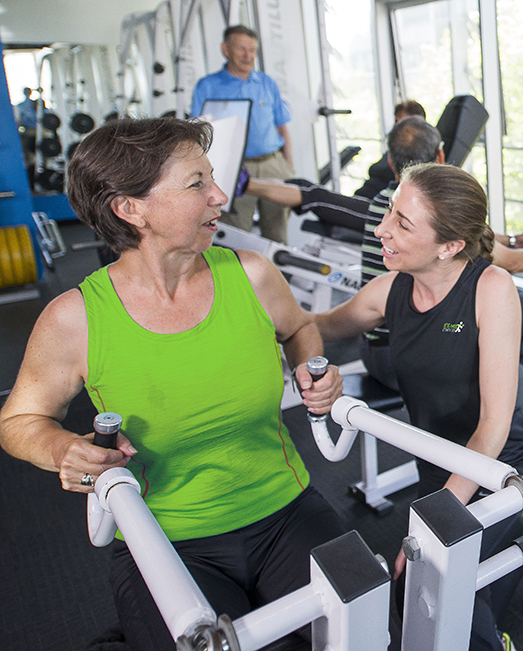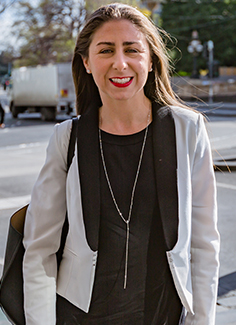Lifestyle
Copyright@ Australian Catholic University 1998-2026 | ABN 15 050 192 660 CRICOS registered provider: 00004G | PRV12008
Copyright@ Australian Catholic University 1998-2026 | ABN 15 050 192 660 CRICOS registered provider: 00004G | PRV12008

Prue Cormie is a woman on a mission. A mission, backed by fierce determination and steely passion, to improve the lives of millions of cancer patients around the world by turning cancer care on its head.
Attitudes to treating cancer, what it takes to give people their best chance at survival and improve their quality of life are changing thanks to the work of Associate Professor Cormie and her team at ACU’s Mary MacKillop Institute for Health Research.
Gone are the days of gently cocooning cancer patients in cotton wool – when rest and relaxation was an essential and endorsed part of care.
A little drug called exercise – generic name: physical activity – has kicked that old-fashioned idea to the kerb as it continues to deliver incredible results, reduce nasty treatment side-effects and improve people’s overall feeling of wellbeing.
Also known by other brand names such as walking, jogging, swimming and lifting weights, prescribed exercise is giving back quality of life to many who saw no hope in cancer’s ravage and destruction.
“We are talking about a dramatic change in how cancer is treated,” Associate Professor Cormie said. “The original thought that we have to protect the patient and encourage rest has been completely turned on its head. Exercise is now a critical component of cancer care with evidence showing that withholding it from cancer patients is harmful.”
These are not statements Associate Professor Cormie makes lightly.
As the lead author of the Clinical Oncology Society of Australia (COSA) position statement on exercise and cancer care, Professor Cormie led the world-first campaign for exercise to be embedded as part of cancer treatment.
Her push is backed by a significant body of research as well as the medical might of Australia’s leading cancer experts and organisations.
By highlighting the role of exercise alongside surgery, chemotherapy and radiation, it calls for all cancer patients to be prescribed exercise as a standard part of cancer care.
The move is supported by 25 influential health and cancer organisations including Cancer Council Australia. And doors in Canberra have creaked open as health ministers and policy advisors start to take notice.
Surely, if there is an excuse to give that spin class a miss, it’s being diagnosed with cancer.
However, when new mum Nicole Cooper, 33, was given the devastating news that she had an aggressive and terminal form of bowel cancer, she wasn’t expecting what came next.
Her oncologist prescribed exercise alongside potent chemotherapy.
“He said let’s do the chemo and I want you in the gym every day,” Ms Cooper said.
Originally identified in the liver, the disease had aggressively spread to her bowel. She was told there was nothing more that could be done apart from palliative chemotherapy treatment.
Her oncologist offered some hope when he was willing to put her on an aggressive chemotherapy regime on the small chance that it could shrink the tumours enough to allow him to operate.
“He said 'we want to prepare you to take the maximum amount of drug you can get into your body, and the only thing in your control is exercise',” Ms Cooper said.
She had to be in optimum condition to handle the demanding program. So, in between bouts of chemotherapy, exercise she did.
It was a lifesaver.
The chemotherapy killed off all but one of the liver tumours.
“I started with a non-operable, life-ending cancer and that’s changed radically for me,” she said. “A year later, I am in remission, having taken just as much exercise as I have chemotherapy.”
Associate Professor Cormie is buoyed by Nicole’s story but says she is not alone in reporting such good news.
“If the benefits of exercise could be turned into a pill – it would be touted as a breakthrough in cancer treatment,” she said. “It would be demanded by patients, prescribed by every cancer specialist and subsidised by government.”
The EX-MED Cancer program is that pill.
Associate Professor Cormie was instrumental in launching the Australian first EX-MED Cancer program, an exercise program for cancer patients designed to help with the side effects of treatment, increase quality of life and potentially improve the chances of survival.
Working with exercise physiologists in local fitness centres and exercise clinics, the program delivers a personalised exercise prescription to complement traditional treatment.
“We have about 20 new patients referred every week and we’ve been overwhelmed by the amount of amazing feedback from patients and health professionals,” she said. “Our vision is to have EX-MED Cancer implemented nationally so as many cancer patients as possible can access this effective medicine.”
Cancer affects one in two Australians, with one diagnosed every four minutes
Yet only one in 10 of those diagnosed will exercise enough during and after their treatment. But every one of those patients would benefit from exercise.
COSA’s position statement on exercise for cancer patients is a drastic shift from current practice in Australia, as most cancer specialists still don’t specifically prescribe exercise as treatment, despite being aware of its benefits.
Associate Professor Cormie said cancer and its treatment can have a devastating effect on people’s lives, causing serious health issues that compromise their physical and mental wellbeing.
Cancer patients who exercise regularly experience fewer and less severe side effects from treatments. Patients with breast, colorectal and prostate cancer also have a lower relative risk of cancer recurrence and a lower relative risk of dying from their cancer.
Exercise specialists can prescribe exercise in a similar way that doctors prescribe medications; by knowing how cancer impacts our health and understanding how certain exercises improve the structure and function of the body’s systems.
The COSA position statement recommends people with cancer progress towards doing two to three resistance sessions a week (such as weights) and embark on at least 150 minutes of moderate aerobic exercise, or 75 minutes of vigorous aerobic exercise (such as walking, jogging, cycling or swimming). However, noting that these levels will be unattainable for some patients, the statement specifies that an individualised approach is required.
It builds on a significant body of evidence about the positive impact exercise has on cancer – with ACU research showing the risk of dying may be reduced by nearly half with regular brisk walking and lifting moderate weights.
Associate Professor Cormie led the review of more than 100 studies published in the American Journal of Epidemiology that found mortality rates among those who regularly exercised fell 28 to 44 per cent.
Prue Cormie has found her niche in exercise medicine. Driven by a fascination about the way exercise changes our bodies, she is leading the paradigm shift in cancer care.
“What drives me is the potential to have such an impact on patients’ lives and to do research that not only has the power to change practice worldwide but influence the care that people get in one of the darkest times of their lives,” she said.
“I have always wanted to do research and figure out how to get people back to being well and living the best life possible. I saw the biggest opportunity in cancer as it affects so many people and exercise has the potential to dramatically change these patient’s lives.”
She recounts a story when a patient told her he was glad he had cancer.
“It completely floored me. When I asked him why he said being involved in this exercise program had changed his life. We hear it all the time … the impact that we have on people’s lives is massive and it’s not just about cancer.
“It makes this work super rewarding and is incredibly inspiring for our team. That’s the impact exercise can have. It is extremely motivating and the reason I love what I do.”
Associate Professor Prue Cormie is a Principal Research Fellow at ACU’s Mary MacKillop Institute for Health Research.

Copyright@ Australian Catholic University 1998-2026 | ABN 15 050 192 660 CRICOS registered provider: 00004G | PRV12008